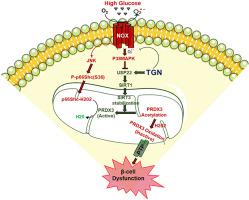Free Radical Biology and Medicine ( IF 7.1 ) Pub Date : 2020-08-05 , DOI: 10.1016/j.freeradbiomed.2020.07.030 Suma Elumalai 1 , Udayakumar Karunakaran 1 , Jun Sung Moon 1 , Kyu Chang Won 1

|
Chronic hyperglycemia has deleterious effects on pancreatic β-cell function and survival in type 2 diabetes (T2D) due to the low expression level of endogenous antioxidants in the β-cells. Peroxiredoxin-3 (PRDX3) is a mitochondria specific H202 scavenger and protects the cell from mitochondrial damage. However, nothing is known about how glucotoxicity influences PRDX3 function in the pancreatic beta cells. Exposure of rat insulinoma INS-1 cells and human beta cells (1.1B4) to high glucose conditions (30mM) stimulated acetylation of PRDX3 which facilitates its hyper-oxidation causing mitochondrial dysfunction by SIRT1 degradation. SIRT1 deficiency induces beta cell apoptosis via NOX-JNK-p66Shc signalosome activation. Herein we investigated the direct effect of Teneligliptin, a newer DPP-4 inhibitor on beta-cell function and survival in response to high glucose conditions. Teneligliptin treatment enhances SIRT1 protein levels and activity by USP22, an ubiquitin specific peptidase. Activated SIRT1 prevents high glucose-induced PRDX3 acetylation by SIRT3 resulted in inhibition of PRDX3 hyper-oxidation thereby strengthening the mitochondrial antioxidant defense. Notably, we identify PRDX3 as a novel SIRT3 target and show their physical interaction. Intriguingly, inhibition of SIRT1 activity by EX-527 or SIRT1 siRNA knockdown exacerbated the SIRT3 mediated PRDX3 deacetylation which leads to peroxiredoxin-3 hyper-oxidation and beta-cell apoptosis by the activation of NOX-JNK-p66Shc signalosome. Collectively, our results unveil a novel and first direct effect of high glucose on PRDX3 acetylation on beta-cell dysfunction by impaired antioxidant defense and SIRT1 mediated SIRT3-PRDX3 activation by Teneligliptin suppresses high glucose-mediated mitochondrial dysfunction.
中文翻译:

高葡萄糖诱导的PRDX3乙酰化有助于胰腺β细胞的葡萄糖中毒:特立格列汀的预防。
由于β细胞内源性抗氧化剂的低表达水平,慢性高血糖症对2型糖尿病(T2D)的胰腺β细胞功能和存活具有有害影响。Peroxiredoxin-3(PRDX3)是线粒体特异的H202清除剂,可保护细胞免受线粒体损害。但是,关于葡萄糖毒性如何影响胰腺β细胞中PRDX3功能的信息尚不清楚。将大鼠胰岛素瘤INS-1细胞和人β细胞(1.1B4)暴露于高葡萄糖条件(30mM)会刺激PRDX3的乙酰化,从而促进PRDX3的过度氧化,从而通过SIRT1降解导致线粒体功能障碍。SIRT1缺乏症通过NOX-JNK-p66Shc信号小体激活诱导β细胞凋亡。在这里,我们研究了特立格列汀的直接作用,新型DPP-4抑制剂对高血糖条件下β细胞功能和存活的影响。Teneligliptin治疗可通过泛素特异性肽酶USP22增强SIRT1蛋白水平和活性。激活的SIRT1阻止了SIRT3引起的高葡萄糖诱导的PRDX3乙酰化,从而抑制了PRDX3的过度氧化,从而增强了线粒体的抗氧化剂防御能力。值得注意的是,我们将PRDX3识别为新型SIRT3目标并显示其物理相互作用。有趣的是,EX-527或SIRT1 siRNA敲除对SIRT1活性的抑制作用加剧了SIRT3介导的PRDX3脱乙酰基作用,后者通过激活NOX-JNK-p66Shc信号小体而导致过氧化物酶3过氧化和β细胞凋亡。总的来说,















































 京公网安备 11010802027423号
京公网安备 11010802027423号